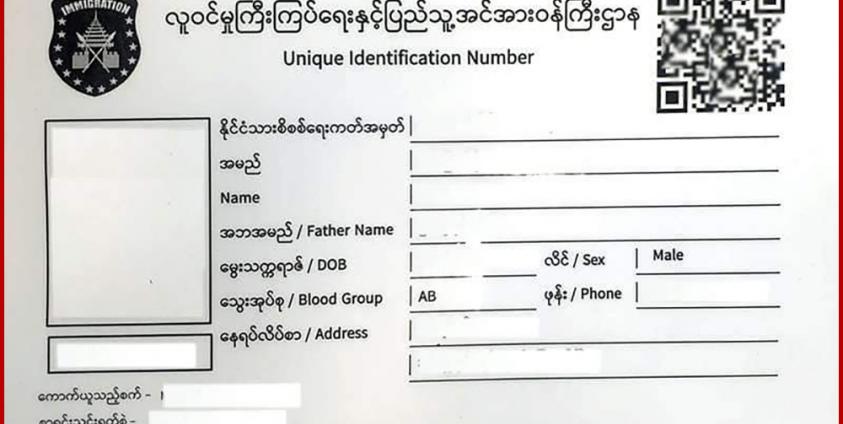In Hpa-An and Myawaddy townships in Karen State, immigration officers acting under the authority of the Military Council, are currently gathering household lists and other personal information for the issuance of Smart NICs (National Identification Cards), locals said.
"The Immigration Department staff, working under the Military Council, are asking for our personal information in order to issue smart cards. They claim that this is being done to identify and apprehend undocumented Rohingya migrants, as well as PDF members if they enter the town. The current NICs will be replaced with new smart cards to make the check process easier”, a government staff in Hpa-An told KIC.
Residents are worried that the Junta is utilizing the ongoing collection of personal information to issue smart NICs to identify and target undocumented Rohingya individuals, as well as members of the People Defense Force (PDF).
It has been reported that, beginning on July 1st, personnel affiliated with the Military Council, along with their families, have been required to undergo a re-verification process for their personal details to obtain smart NICs. Additionally, the collection of household list data in Myawaddy has been observed to be gaining momentum.
Since July 4th, data collection has expanded beyond government employees in Myawaddy, with residents of No. 1 ward also being requested to provide their personal information.
"Their plan is to introduce smart cards to facilitate easy identification during checkpoint inspections in the future. Since there is a significant population of Rohingya Muslims residing in Myawaddy's No.1 ward, many locals do not possess NICs due to the presence of numerous unsettled individuals. Given the introduction of smart NICs, I anticipate an increase in fraudulent activities and corruption within departments such as the ward administration office”, a Myawaddy resident remarked.
The Military Council has initiated the implementation of new Smart NIC at the same time as Military Council troops are presently engaging in illicit activities by extorting money from individuals passing through checkpoints in the region, thereby profiting from these unlawful actions.
Over two years have passed since the Military Council carried out the coup, and distressingly, more than 100 Rohingya individuals have been identified, apprehended in Myawaddy, Kyondoe, and Kawkareik townships of Karen State, and imprisoned in Taungkaly Prison. Furthermore, reliable sources within the department have confirmed that 10 underage Rohingya individuals have been detained at the Kawkareik Immigration Department.








